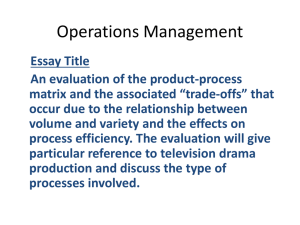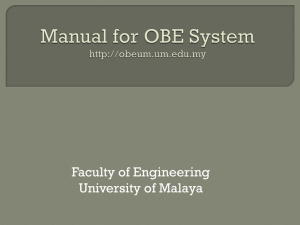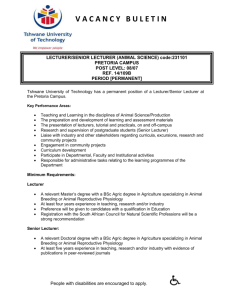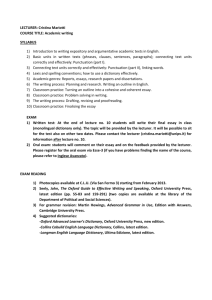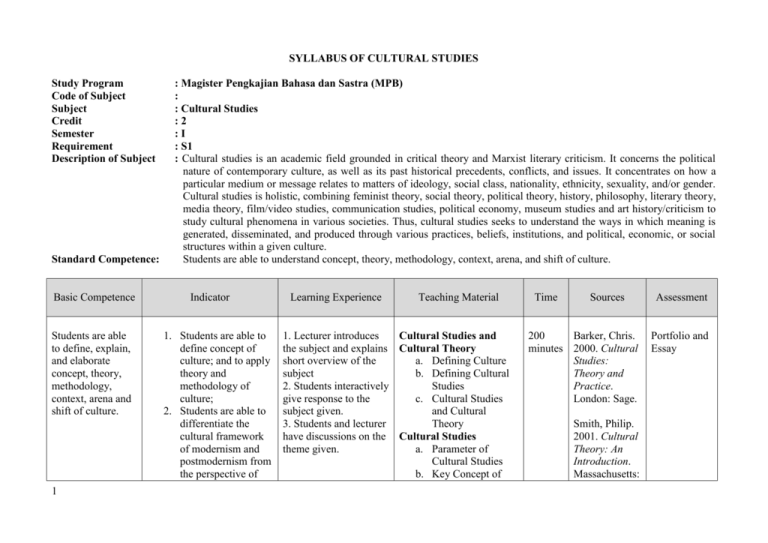
SYLLABUS OF CULTURAL STUDIES
Study Program
Code of Subject
Subject
Credit
Semester
Requirement
Description of Subject
Standard Competence:
Basic Competence
Students are able
to define, explain,
and elaborate
concept, theory,
methodology,
context, arena and
shift of culture.
1
: Magister Pengkajian Bahasa dan Sastra (MPB)
:
: Cultural Studies
:2
:I
: S1
: Cultural studies is an academic field grounded in critical theory and Marxist literary criticism. It concerns the political
nature of contemporary culture, as well as its past historical precedents, conflicts, and issues. It concentrates on how a
particular medium or message relates to matters of ideology, social class, nationality, ethnicity, sexuality, and/or gender.
Cultural studies is holistic, combining feminist theory, social theory, political theory, history, philosophy, literary theory,
media theory, film/video studies, communication studies, political economy, museum studies and art history/criticism to
study cultural phenomena in various societies. Thus, cultural studies seeks to understand the ways in which meaning is
generated, disseminated, and produced through various practices, beliefs, institutions, and political, economic, or social
structures within a given culture.
Students are able to understand concept, theory, methodology, context, arena, and shift of culture.
Indicator
1. Students are able to
define concept of
culture; and to apply
theory and
methodology of
culture;
2. Students are able to
differentiate the
cultural framework
of modernism and
postmodernism from
the perspective of
Learning Experience
Teaching Material
1. Lecturer introduces
Cultural Studies and
the subject and explains Cultural Theory
short overview of the
a. Defining Culture
subject
b. Defining Cultural
2. Students interactively
Studies
give response to the
c. Cultural Studies
subject given.
and Cultural
3. Students and lecturer
Theory
have discussions on the Cultural Studies
theme given.
a. Parameter of
Cultural Studies
b. Key Concept of
Time
Sources
200
Barker, Chris.
minutes 2000. Cultural
Studies:
Theory and
Practice.
London: Sage.
Smith, Philip.
2001. Cultural
Theory: An
Introduction.
Massachusetts:
Assessment
Portfolio and
Essay
critical approach;
Students are able
to define, explain,
and elaborate
concept, theory,
methodology,
context, arena and
shift of culture.
2
Students are able
1. to define
methodology in
cultural studies;
2. to differentiate
different
epistemology in
cultural studies.
3. Students are able to
explain model in
cultural studies
Cultural Studies
c. Intellectual
Characteristics of
Cultural Studies
d. Marxism,
Structuralism,
Post-Structuralism
(Postmodernism),
Postcolonialism
1. Lecturer opens the
class and ask the group Methodology in Cultural
to have a presentation.
Studies
2. Students interactively
give response to the
a. Epistemology:
presentation.
Objectivity &
3. Students and lecturer
Subjectivity,
have discussions on the
Deductive &
theme given.
Inductive
4. Students and lecturer
b. Model in Cultural
sum up the discussion.
Studies:
Ethnography,
Textual, Reception
Studies, Symbolic
Interactionism,
Grounded Theory,
Cross Cultural
Studies, Content
Analysis, Life
History, Case
Study
Blackwell Pub.
200
Valdes, J.M.
minutes (Ed.). 1986.
Cultural
Bound:
Bridging the
Cultural Gap
in Language
Teaching.
Cambridge:
CUP.
Van RijHeyligers,
Josta (Ed.).
2008.
Intercultural
Communicatio
ns across
University
Settings—
Myths and
Realities. New
Zealand:
Portfolio and
Essay
Pearson
Prentice Hall.
Students are able
to define, explain,
and elaborate
concept, theory,
methodology,
context, arena and
shift of culture.
3
Students are able
1. to define concept of
classical theory,
modern theory, and
postmodernism.
2. to differentiate the
cultural framework
of modernism and
postmodernism from
the perspective of
critical approach;
1. Lecturer opens the
class and ask the group
to have a presentation.
2. Students interactively
give response to the
presentation.
3. Students and lecturer
have discussions on the
theme given.
4. Students and lecturer
sum up the discussion.
Classical Theory of
Cultural Studies
a. Evolutionism
b. Cultural Diffusion
c. Cultural
Functionalism
d. Structural
Functionalism
Modern Theories of
Cultural Studies
a. Structuralism of
Levi-Strauss
b. Cultural
Interpretation
c. Ethnoscience and
Ethnomethodology
d. Postmodernism
Postmodernism
a. Concept of
Postmodernism
b. Modernity and
Culture
c. Modern
Knowledge and
Post
Culture and Ideology
a. Anthropological
Approach toward
Culture
b. Low and High
200
Milner,
minutes Andrew and
Jeff Browitt.
2002.
Contemporary
Cultural
Theory.
Singapore:
South Wind
Production.
Portfolio and
Essay
Culture (Concept
of Central and
Peripheral)
c. Mass/Pop Culture
d. Culture and Social
Construction
e. Ideology Culture:
Marxism and False
Consciousness;
Althusse and
Ideology; Gramsci,
Ideology and
Hegemony
Students are able
to define, explain,
and elaborate
concept, theory,
methodology,
context, arena and
shift of culture.
4
Students are able
1. to define concept of
culture, meaning and
knowledge in
cultural studies.
2. to differentiate the
linguistics circle in
cultural studies
1. Lecturer opens the
class and ask the group
to have a presentation.
2. Students interactively
give response to the
presentation.
3. Students and lecturer
have discussions on the
theme given.
4. Students and lecturer
sum up the discussion.
Culture, Meaning, and
Knowledge: Linguistics
Circle in Cultural
Studies
a. Saussure and
Semiotics
b. Barthes and
Mythology
c. Derrida: Textuality
and Difference
d. Foucault:
Discourse,
Practice, and
Power
e. Post Marxism
f. Language and
Psychoanalysis
g. Language in Use:
Wittgenstein and
200
Valdes, J.M.
minutes (Ed.). 1986.
Cultural
Bound:
Bridging the
Cultural Gap
in Language
Teaching.
Cambridge:
CUP.
Van RijHeyligers,
Josta (Ed.).
2008.
Intercultural
Communicatio
ns across
University
Portfolio and
Essay
Rorty
Settings—
Myths and
Realities. New
Zealand:
Pearson
Prentice Hall.
Students are able
to define, explain,
and elaborate
concept, theory,
methodology,
context, arena and
shift of culture.
Students are able
1. to define contextual
change in cultural
studies
1. Lecturer opens the
Contextual Change in
class and ask the group Cultural Studies, New
to have a presentation.
Chaos in Earth
2. Students interactively
a. Economy,
give response to the
Technology, and
presentation.
Social Class
3. Students and lecturer
b. Globalization
have discussions on the
c. New Social
theme given.
Movement
4. Students and lecturer
sum up the discussion.
Students are able
to define, explain,
and elaborate
concept, theory,
methodology,
context, arena and
shift of culture.
Students are able
1. to define arenas of
cultural studies;
2. to differentiate
issues of
subjectivity,
ethnicity, sex, and
representation.
3. To explain the
cultural space and
cultural polity in
cultural studies.
1. Lecturer opens the
200
Arenas of Cultural
class and ask the group Studies
minutes
to have a presentation.
a. Issues of
2. Students interactively
Subjectivity and
give response to the
Identity
presentation.
b. Ethnicity, Race and
3. Students and lecturer
Nation
have discussions on the
c. Sex, Subjectivity,
theme given.
and Representation
4. Students and lecturer
d. Cultural Space and
sum up the discussion.
City
e. Youth, Space, and
Rebellion
f. Cultural Polity and
5
200
Kramsch, C.
minutes 1993. Context
and Culture in
Language
Teaching.
Oxford: OUP.
Kramsch, C.
1993. Context
and Culture in
Language
Teaching.
Oxford: OUP.
Milner,
Andrew and
Jeff Browitt.
2002.
Contemporary
Cultural
Theory.
Portfolio and
Essay
Portfolio and
Essay
Policy
Students are able
to define, explain,
and elaborate
concept, theory,
methodology,
context, arena and
shift of culture.
Students are able
1. to explain culture of
Islamic Tradition
and Javanese Culture
within the context of
Cultural Studies;
2. to use particular
cultural context and
arena as subject of
study within the
context of Cultural
Studies.
1. Lecturer opens the
Culture of Islamic
class and ask the group Tradition
to have a presentation.
a. African and
2. Students interactively
Middle-East
give response to the
Islamic Tradition
presentation.
b. South and Central
3. Students and lecturer
Asia Islamic
have discussions on the
Tradition
theme given.
c. South-East Asia
4. Students and lecturer
Islamic Tradition
sum up the discussion.
Javanese Culture
a. Central Javanese
Culture: Surakarta
and Yogyakarta
b. Peripheral
Javanese Culture:
Rural areas
(Ngawi, Madiun)
and Coastal areas
(Banyumas,
Semarang,
Surabaya)
Singapore:
South Wind
Production.
Al Faruqi,
Ismail R. &
Lois Ibsen Al
Faruqi. 1986.
The Cultural
Atlas of Islam.
New York:
MacMillan.
Benedict,
Anderson.
1963.
Imagined
Communities:
Reflections on
the Origin and
Spread of
Nationalism.
Yale
University:
South
East Asian
Studies.
Koentjaraningr
at. 1994.
Kebudayaan
Jawa. Jakarta:
Balai Pustaka.
6
Portfolio and
Essay
References:
Al Faruqi, Ismail R. & Lois Ibsen Al Faruqi. 1986. The Cultural Atlas of Islam. New York: MacMillan.
Barker, Chris. 2000. Cultural Studies: Theory and Practice. London: Sage.
Benedict, Anderson. 1963. Imagined Communities: Reflections on the Origin and Spread of Nationalism. Yale University: South
East Asian Studies.
Geertz, Clifford. 1973. The Interpretation of Cultures. Essex: Hutchinson of London.
_____________. 1998. After the Fact: Dua Negeri, Empat Dasawarsa, Satu Antropolog. (Terj. Landung Simatupang). Yogyakarta:
LKIS.
Kramsch, C. 1993. Context and Culture in Language Teaching. Oxford: OUP.
Koentjaraningrat. 1994. Kebudayaan Jawa. Jakarta: Balai Pustaka.
Milner, Andrew and Jeff Browitt. 2002. Contemporary Cultural Theory. Singapore: South Wind Production.
Robinson, G.L.N. 1985. Crosscultural Understanding. New York: Prentice Hall.
Samovar, Larry A. & Richard E. Porter. 1995. Communication Between Cultures. Belmont: Wadsworth Pub.Co.
Smith, Philip. 2001. Cultural Theory: An Introduction. Massachusetts: Blackwell Pub.
Valdes, J.M. (Ed.). 1986. Cultural Bound: Bridging the Cultural Gap in Language Teaching. Cambridge: CUP.
Van Rij-Heyligers, Josta (Ed.). 2008. Intercultural Communications across University Settings—Myths and Realities. New Zealand:
Pearson Prentice Hall.
Head of Department
Surakarta, 18 January 2011
Lecturer,
Prof. Dr. Markhamah, M.Hum.
Dr. Phil. Dewi Candraningrum, M.Ed.
7



